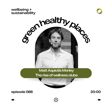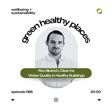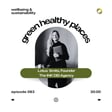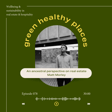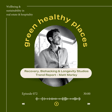
Functional health bars with Guy Morley, Co-Founder of Upraising
Welcome to episode 067 of the Green Healthy Places podcast, in which we explore the themes of wellbeing and sustainability in real estate and hospitality. I’m you host Matt Morley and in this episode in in my home town of Barcelona, Spain talking to Guy Morley, no relation.
Guy is the Co-Founder of Upraising an organic coffee brand powered by nootropics and adaptogens (we’ll get to what these terms mean shortly).
He previously built the iced tea brand Kailani and before that worked as a music and entertainment lawyer in London, UK.
So before I bring Guy in, let me establish some context here.
The health and wellness industry has been witnessing a paradigm shift in recent years.
As more people become conscious of their overall wellbeing, inside and out, mental and physical, mind-body and spirit, the demand for hospitality concepts tailored to this shift to a quasi biohacking approach is slowly becoming more mainstream.
One such innovation is the emergence of a new breed of performance health bar, a unique wellness concept that focuses on offering a diverse range of health-promoting products and services.
The objective here is very specific:
1/ to help clients prep themselves for performance
2/ assist them in maintaining performance whilst in action
3/ promote recovery post activity, helping them get back out there, ready to go one more time.
The future of health bars in my opinion lies in incorporating cutting-edge ingredients and technologies, combined with biophilic design, to create a holistic wellness experience maximized for its positive impact on overall health.
This includes the use of adaptogenic mushrooms, nootropics, supplements, and nutritious beverages to support various aspects of health.
Additionally, the adoption of sustainable and eco-friendly interior design practices, such as biophilic design and a strict sustainable, non-toxic materials policy in the fit-out, ensures the aesthetic context is aligned with the concept. ensuring the health bar has been maximized for its wellbeing properties.
Today, I am joined by a man on the forefront of creating the type of functional beverage products that will, I believe, come to populate this new generation of wellness bar concepts that I’m betting represent the future of F&B offerings at premium boutique fitness studios, health clubs and wellness oriented members clubs.
Guy thanks for joining us on the podcast!

